
Chess is a recreational and competitive board game played between two players. Sometimes called Western or international chess to distinguish it from its predecessors and related games such as xiangqi, the current form of the game emerged in Southern Europe during the second half of the 15th century after evolving from similar, much older games of Indian and Persian origin. Today, chess is one of the world's most popular games, played by millions of people worldwide at home, in clubs, online, by correspondence, and in tournaments.

The Commodore 64, also known as the C64 or the CBM 64, is an 8-bit home computer introduced in January 1982 by Commodore International. It has been listed in the Guinness World Records as the highest-selling single computer model of all time, with independent estimates placing the number sold between 12.5 and 17 million units. This claim is in spite of the Commodore 64 having three different Kernal ROM versions, two different SID sound chip versions, a few different motherboard versions and two different cases during its lifetime. Volume production started in early 1982, marketing in August for US$595. Preceded by the Commodore VIC-20 and Commodore PET, the C64 took its name from its 64 kilobytes(65,536 bytes) of RAM. With support for multicolor sprites and a custom chip for waveform generation, the C64 could create superior visuals and audio compared to systems without such custom hardware.

Commodore International was an American home computer and electronics manufacturer founded by Jack Tramiel. Commodore International (CI), along with its subsidiary Commodore Business Machines (CBM), was a significant participant in the development of the home personal computer industry in the 1970s and 1980s. The company developed and marketed the world's best-selling desktop computer, the Commodore 64 (1982), and released its Amiga computer line in July 1985. With quarterly sales ending 1983 of $49 million, Commodore was one of the world's largest personal computer manufacturers.
This glossary of chess explains commonly used terms in chess, in alphabetical order. Some of these terms have their own pages, like fork and pin. For a list of unorthodox chess pieces, see Fairy chess piece; for a list of terms specific to chess problems, see Glossary of chess problems; for a list of named opening lines, see List of chess openings; for a list of chess-related games, see List of chess variants.

Jørgen Bent Larsen was a Danish chess grandmaster and author. Known for his imaginative and unorthodox style of play, he was the first Western player to pose a serious challenge to the Soviet Union's dominance in chess. He is considered to be the strongest player born in Denmark and the strongest from Scandinavia until the emergence of Magnus Carlsen.
64 (sixty-four) is the natural number following 63 and preceding 65.
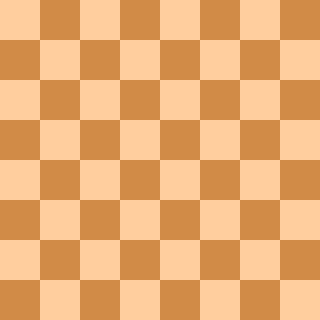
The Queen's Gambit is the chess opening that starts with the moves:
This is a timeline of chess. See also: Timeline of women in chess.
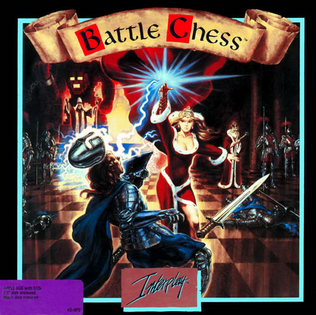
Battle Chess is a computer game version of chess in which the chess pieces come to life and battle one another when capturing. It was originally developed and released by Interplay Entertainment for the Amiga in 1988 and subsequently on many other systems, including 3DO Interactive Multiplayer, Acorn Archimedes, Amiga CD32, Amiga CDTV, Apple IIGS, Apple IIe, Atari ST, Commodore 64, MS-DOS, FM Towns, NES, Mac OS, NEC PC-9801, X68000 and Microsoft Windows. In 1991, Battle Chess Enhanced was released by Interplay for the PC, featuring improved VGA graphics and a symphonic musical score that played from the CD-ROM.

Grob's Attack is an unconventional chess opening where White immediately moves the king knight's pawn two squares ahead:

Chessmaster is a chess-playing computer game series which is now owned and developed by Ubisoft. It is the best-selling chess franchise in history, with more than five million units sold as of 2002.

Andrew Eden Soltis is an American chess grandmaster, author and columnist. He was inducted into the United States Chess Hall of Fame in September 2011.

Robert James Fischer was an American chess grandmaster and the eleventh World Chess Champion.
Hydra was a chess machine, designed by a team with Dr. Christian "Chrilly" Donninger, Dr. Ulf Lorenz, GM Christopher Lutz and Muhammad Nasir Ali. Since 2006 the development team consisted only of Donninger and Lutz. Hydra was under the patronage of the PAL Group and Sheikh Tahnoon Bin Zayed Al Nahyan of Abu Dhabi. The goal of the Hydra Project was to dominate the computer chess world, and finally have an accepted victory over humans.

Titus Interactive SA, known as Titus France SA until March 1999, was a French software publisher that produced and published video games for various platforms. Its head office was located in Parc de l'Esplanade in Lagny sur Marne in Greater Paris. At one time, it was instead located in Montfermeil, also in Greater Paris.
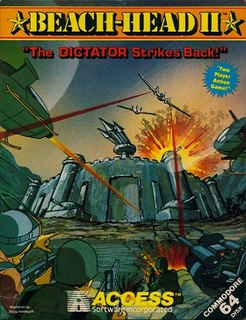
Beach Head II: The Dictator Strikes Back is a 1985 video game for the Commodore 64, a sequel to Beach Head, developed and published by Access Software. It was designed by Bruce Carver and his brother, Roger, and was released for the Amstrad CPC, Apple II, Atari 8-bit family, Commodore 64, and ZX Spectrum.

Beach-Head is a video game developed and published in 1983 by Access Software for the Atari 8-bit family and Commodore 64 home computers in the US. Versions for the Commodore 16, ZX Spectrum, BBC Micro, and Acorn Electron were published in Europe by U.S. Gold in 1984, followed by a version for the Amstrad CPC platform in 1985.
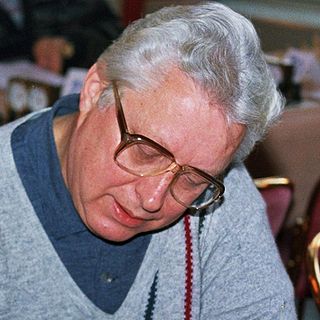
Evgeni Andreyevich Vasiukov was a Russian chess player, one of the strongest in the world during his peak. He was awarded the title of Grandmaster by FIDE in 1961. During his career, he won the Moscow Championship on six occasions and scored numerous victories in international tournaments, such as Belgrade Open 1961, Moscow International 1961, East Berlin 1962, Reykjavik 1968, and Manila 1974. He was rarely at his best in Soviet Championship Finals, which were among the very toughest events in the world, and never made the Soviet team for an Olympiad or a European Team Championship. Vasiukov won the World Senior Chess Championship in 1995.
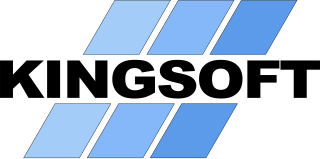
Kingsoft GmbH was a German video game company based in Aachen. The company was founded in 1982 by Fritz Schäfer out of his parents' house in Mulartshütte (Roetgen) to sell his chess simulation game Boss, which he developed the year before. Kingsoft expanded into third-party publishing in 1983, starting with Galaxy by Henrik Wening. Most of their games were released for computers developed by Commodore International, predominantly the Commodore 64, Commodore 16 and later Amiga, and were usually based on other company's titles for different platforms. Kingsoft moved to Aachen in 1987 and established a distribution service before ceasing publishing in favour of distribution in 1993. The company was acquired in March 1995 by Electronic Arts, who retired the Kingsoft name later that year.

Colossus Chess is a series of chess-playing computer programs developed by Martin Bryant, commercially available for various home computers in the 1980s.














